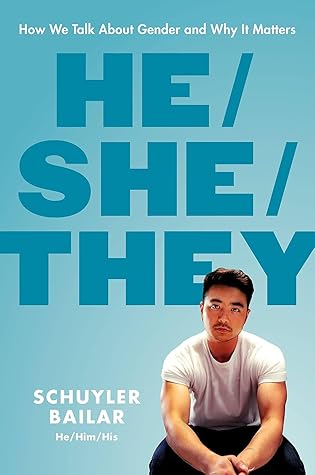More on this book
Community
Kindle Notes & Highlights
Read between
October 29 - November 4, 2023
Transgender is an adjective that describes people whose gender identity differs from the gender they were assigned at birth.
when people who society generally considers the default are not treated as the default, those people get angry and feel othered.
The application of the word cis only undermines the gender of a cisgender person if they do not believe that trans people are valid in our genders.
Gender identity is an arrow pointing inward: it is who I am. Sexuality is an arrow pointing outward: to whom I am attracted.
That is, this concept of “gender” was largely constructed by European colonization with the original intent of gaining power and control.
gender is “an array of mental and behavioral characteristics that relate to and differentiate from and go beyond understandings of masculinity, femininity, and neutrality.”
intent does not bar impact.
It does not matter if I can justify my manhood in words that others will accept. I know that living my life in this way is far better for my mental health, for my very survival, than how I was living before. And in some ways, it’s that simple.
Parents, siblings, and friends of trans people are not required to understand us in order to accept, respect, and love us. Sometimes, understanding is one of the last things to emerge, and that is okay. Many parents fail to metabolize this and instead forbid their children from accessing joy that comes from something they do not understand. Letting go of the need to understand requires trusting your child. It requires allowing another person to learn for themselves and granting them space to know themselves best.
No person randomly comes to the conclusion one minute that they are trans, having never considered it before, and then spouts it to the next person who will listen. Most people have spent months, if not years, thinking this through, crying themselves to sleep at night, agonizing over how and when and what to say about their identities.
Anti–trans athlete bills legitimize incredibly patriarchal, racist, misogynistic, and transphobic conceptions of womanhood, solidifying womanhood as only what is seen as “woman” by patriarchy and white supremacy.
If you are afraid of a cis man pretending to be a woman in order to win women’s sports, you are afraid of toxic cis men, not trans women!
I see my transness as such an integral part of my manhood. I feel that the womanhood I have experienced is inextricably linked to my manhood—I firmly believe that many of the ways in which my mom taught me to be a woman have made me the man I am today. And what a beautifully complex truth that is.
I want to remind you that, especially for those of us with intersecting identities, this resilience is not a choice. It may be brave, but it is also mandatory for us to be able to continue forward with our sanity intact and lasting capacity for joy.
“The objective of oppression [is] to shatter your ability to dream, to aspire, to envision… it’s meant to erase you. To essentially abolish you into the margins.
It gets better—but not because other people accept us; it gets easier because we accept us.
That night, I cried harder than I had ever cried before. After Smith left, I’d written out a list of things that I felt, among them: worthless, not good enough, weird, not part of the team, unliked, strange, freak, an “other,” and bad. OUTCAST, I wrote in big bold letters.
I try to choose engaging only when the following criteria are all satisfied: DEPTS: Desire: I want to. Energy: I have the energy. (Another way to verify this one is to ask: Will engaging be harmful to me?) Productivity: I think it is productive—for the recipient and for me. Time: I have the time. Safety: It is physically safe to do so.
“You are so calm while others are not” actually says: “I only respect and value pain when it is presented to me in a way I accept.” It demands: “Do not show me the pain that this system—of which I am a part and likely perpetuate—has caused you. Pretend it doesn’t exist so that I am more comfortable in your presence.”
I’ve also honed another method that helps me disengage ego as I’ve received feedback: the separation of self and work—of what you do, and who you are. If we integrate feedback we receive onto the sphere of work, instead of self, we are far more likely to improve action and maintain our mental well-being.


